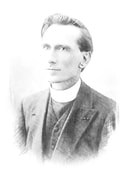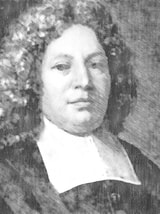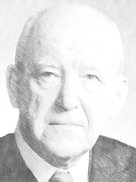I John 1
|
I John 1:2:
"(For the life was manifested, and we have seen it, and bear witness, and shew unto you that eternal life, which was with the father, and manifested unto us.") |
Christianity has its theoretical explanations but it is more than a theory of religion; it is an experience of life. It must be something so definite that we can bear witness to it. Why do movies have such a hold on the public and churches are losing their grasp? Because motion picture producers, writers and directors take the unreal and impossible and make them real, whereas the modern day preacher makes the real and seemingly impossible, unreal." |
|
I John 1:3:
"That which we have seen and heard declare we unto you, that ye also may have fellowship with us: and truly our fellowship is with the Father, and with his Son Jesus Christ." |
Fellowship is much more than companionship or comradeship. It means the community of thought and interest. It means a state of unity and harmony. It implies what was true in the Garden of Eden when man's experience of God was intimate and immediate. It is a mutual "entering into" of one another's experience. The original state of man's relation to God is restored by Christian experience. It is found in fellowship. We are at one with each other. It means sharing our common experience of eternal life. When we exchange what we know of Christ we are having fellowship. This can be the most enriching experience of life, producing a bond of affection more endearing than blood relationship. |
 Thomas Watson
Thomas Watson
“Question: What is it, to walk with God? Answer: Walking with God imports five things: 1. Walking as under God's eye. Noah reverenced God. A godly man sets himself as in God's presence, knowing that his judge is looking on: "I have set the Lord always before me" (Psalm 16:8). David's eyes were here. 2. The familiarity and intimacy which the soul has with God. Friends walk together and console themselves with one another. The godly make known their requests to God and he makes known his love to them. There is a sweet fellowship between God and his people: "Our fellowship (koinonia) is with the Father, and with his Son Jesus Christ" (1 John 1:3). 3. Walking above the earth. A godly man is elevated above all sublunary objects. The person who walks with God must ascend very high. A dwarf cannot walk among the stars, nor can a dwarfish, earthly soul walk with God. 4. Visible piety. Walking is a visible posture. Grace must be conspicuous to the onlookers. He who reveals something of God in his behavior, walks with God. He shines forth in biblical conduct. 5. Continued progress in grace. It is not only a step but a walk. There is a going on towards maturity. A godly man does not sit down in the middle of the way but goes on until he comes to the "end of his faith" (1 Pet. 1:9). Though a good man may be out of the path, he is not out of the way. He may through infirmity step aside (as Peter did)—but he recovers by repentance and goes on in progressive holiness: "The righteous will hold to their ways, and those with clean hands will grow stronger" (Job 17:9).”
― Thomas Watson, The Essential Works Of Thomas Watson
― Thomas Watson, The Essential Works Of Thomas Watson
|
I John 1:4:
We write this to make our joy complete. |
When we look at the core of the cosmos we are met by the Living God who creates, who speaks for Himself, who has surprised us by knowing our names. When this surprise sinks in, then the joyous fellowship begins. |

The apostle John teaches with bald simplicity the truths of the gospel, and his clarity often comes through the use of negation. John writes, “This is the message we have heard from him and proclaim to you, that God is light, and in him is no darkness at all” (1 John 1:5). So, Jesus told the apostles about the character of God as light, not darkness. John then goes on to say something that (apparently) wasn’t a part of that explicit teaching. “If we say we have fellowship with him while we walk in darkness, we lie and do not practice the truth” (1 John 1:6). Though this is a natural implication from the first statement, it’s not explicit. John teaches what wasn’t said to clarify what was said. He didn’t just string together a list of positive doctrinal statements or quotes, but he expanded on them and enriched his hearers’ understanding by showing them both what those statements mean and do not mean. -Dan Crabtree; Cripplegate
 Oswald Chambers
Oswald Chambers
“Purity in God's children is not thew outcome of obedience to His Law, but the result of the supernatural work of His grace. 'I will cleanse you'; 'I will give you a new heart'; 'I will put my Spirit within you and cause you to walk in My statutes'; I will do it all'”
― Oswald Chambers
“Purity in God's children is not thew outcome of obedience to His Law, but the result of the supernatural work of His grace. 'I will cleanse you'; 'I will give you a new heart'; 'I will put my Spirit within you and cause you to walk in My statutes'; I will do it all'”
― Oswald Chambers

The Apostle John often starts his books by referring to the beginning of the Scriptures. John 1 says, “In the beginning…” 1 John 1 says, “That which was from the beginning…” In both, he’s talking about the Garden of Eden.
In the Garden, Adam and Eve went and hid when they had sinned. They ran to the cover of darkness. Darkness appeared safer to them than the light. The trauma of sin usually involves shame, horror, generally freaking out.
God was walking through the Garden and called to them. He called them to the light. He called them to expose what they had done. As they flailed about with their reasoning and blame-shifting and rationalizing, God stands in the light and speaks the truth. --Christ For You
In the Garden, Adam and Eve went and hid when they had sinned. They ran to the cover of darkness. Darkness appeared safer to them than the light. The trauma of sin usually involves shame, horror, generally freaking out.
God was walking through the Garden and called to them. He called them to the light. He called them to expose what they had done. As they flailed about with their reasoning and blame-shifting and rationalizing, God stands in the light and speaks the truth. --Christ For You

John now identifies himself with believers, rather than the Apostles, as he writes, “If we say”. Therefore, the first false claim John makes is the assertion that we can have fellowship with God, while at the same we walk habitually in darkness.
Therefore, to walk in darkness or sin, indicates a continual, habitual practice of that which is opposed to God. It is a shared life with darkness and sin rather than with God Himself. It is to live outside of the revelation of God’s character and will in Scripture. (John 3:19-20) The proof of being a Christian is found by the life one leads. This does not necessarily just mean living in sin; but also to live without reference to the will of God, to live according to the worldly standards, to seek selfish goals and to exclude Christ and a life of submission to Him. This makes our fellowship with God impossible.5 So John denies the erroneous assertion that applies to anyone who claims to know God, while at the same time treats sin and morality lightly. Believing the right thing is no substitute for living the right thing. Psalm 51:6 talks about what God seeks and that is truth in the inward being and not an outward show. When that is present, it will be obvious in all areas of life. So, John says that those who habitually walk in darkness instead of the light, are in darkness. Romans 6:2 begs the question of how should we who have died to sin still live in sin? -Capitol Commission
Therefore, to walk in darkness or sin, indicates a continual, habitual practice of that which is opposed to God. It is a shared life with darkness and sin rather than with God Himself. It is to live outside of the revelation of God’s character and will in Scripture. (John 3:19-20) The proof of being a Christian is found by the life one leads. This does not necessarily just mean living in sin; but also to live without reference to the will of God, to live according to the worldly standards, to seek selfish goals and to exclude Christ and a life of submission to Him. This makes our fellowship with God impossible.5 So John denies the erroneous assertion that applies to anyone who claims to know God, while at the same time treats sin and morality lightly. Believing the right thing is no substitute for living the right thing. Psalm 51:6 talks about what God seeks and that is truth in the inward being and not an outward show. When that is present, it will be obvious in all areas of life. So, John says that those who habitually walk in darkness instead of the light, are in darkness. Romans 6:2 begs the question of how should we who have died to sin still live in sin? -Capitol Commission

Is it possible for believers to walk in darkness? No, not the way the Scripture teaches. The darkness is the natural state of the unbeliever. The darkness is contrary to the light. There may be those who claim to be part of the church but still walk in darkness. That’s because not everyone in the church is in Christ. -Grace For My Heart

John is giving instructions about fellowship with God rather than about gaining or keeping a relationship with God. He says that if we claim we are friends with God, but we walk in sin and darkness, then we’re lying, because God only walks in the light.
One cannot walk in the darkness and also be a friend with God.
While a person can be a child of God and walk in the darkness, such a child is living in rebellion and is not abiding with Christ or living in fellowship with God. If we walk in the darkness, we obviously cannot be walking with God, because God does not walk in the darkness but in the light.
But if we walk in the light, then we will obviously be walking with God—going where God goes and doing what God does, because God walks in the light.
Walking in the light, however, leads to fellowship both with God and one another, as Jesus works to cleanse us from sin and help us live in unity and peace with each other.
This is a much more encouraging and helpful message, as it does not lead to doubt and fear about our standing with God or eternal destiny, but instead helps us move forward in our life with God on the basis of His infinite and undying love for us (1 John 4:7-19). -Redeeming God
One cannot walk in the darkness and also be a friend with God.
While a person can be a child of God and walk in the darkness, such a child is living in rebellion and is not abiding with Christ or living in fellowship with God. If we walk in the darkness, we obviously cannot be walking with God, because God does not walk in the darkness but in the light.
But if we walk in the light, then we will obviously be walking with God—going where God goes and doing what God does, because God walks in the light.
Walking in the light, however, leads to fellowship both with God and one another, as Jesus works to cleanse us from sin and help us live in unity and peace with each other.
This is a much more encouraging and helpful message, as it does not lead to doubt and fear about our standing with God or eternal destiny, but instead helps us move forward in our life with God on the basis of His infinite and undying love for us (1 John 4:7-19). -Redeeming God

According to this view John's purpose in writing the epistle was to encourage his readers, who were understood to be believers, to assure themselves of their salvation by verifying the validity of their profession through tests of spiritual life. These tests include doctrinal agreement with the apostles' teaching and submission to their standard of conduct, namely, loving the brethren and living righteously. Eternal life, understood as a soteriological term, is the subject of the epistle, with Christian certainty serving as the dominant theme throughout the work. Salvation is the subject of the epistle's prologue in its focus on the "Word of Life" and the apostolic proclamation of "eternal life" (1Jn 1:1-2). With eternal life as its central subject, the epistle develops three tests by which members of the believing community can recognize that they do indeed possess that life.
These three tests of the Christian life are belief (truth), righteousness (obedience), and love. These indicate whether a person has eternal life, and is therefore in communion with God, or does not and is merely professing faith. Passing these tests produces assurance of salvation, since there is a correlation between possession of life and production of fruit as evidence of eternal life. John's purpose was not to cause his readers to doubt their salvation, but to find assurance in it. Fruit can be used either to reveal the absence of eternal life in an individual or to assure him of the presence of that life. -Precept Austin We come to the Lord in need of salvation and forgiveness and He accepts us in our sinful state and cleanses us by His shed blood, sanctified by the Spirit, and justified by God. “Therefore, if anyone is in Christ, he is a new creation; old things have passed away; behold, all things have become new” (2 Corinthians 5:17) - Nate Holdridge |

But what does this walk in the light look like? As I already said, it does not mean moral perfection. It does not mean you'll never experience temptation. And it is not some unattainable life only a select few, real saints, ever achieve.
No, to walk in the light is a normal Christian life and experience. To walk in darkness is to try to turn off God and His light. To walk in the light is to want to live where God is, to have your whole life illuminated by Him. There are many biblical examples of those who walked in darkness when they should've walked in the light. One was a man in the Old Testament era named Achan. The people of Israel had God's help and power when they entered the Promised Land. God wanted to judge the nations and peoples of Canaan, and He used the people of Israel to do so. When they fought their first battle, it was against a city called Jericho, and God told them none of those spoils belonged to them. Later, they could inherit the wealth of the people's God judged, but not the people of Jericho. It was all to belong to God. Well, Achan didn't like God's command, so he took a Babylonian garment and wedge of gold and hid them in his tent. Eventually, his sin was uncovered, and he was punished, made an example of for the generations to come, but I have often thought about Achan's experience. How hard it must have been for him to carry that shame and guilt around! He had to live a lie. He couldn't wear the garment or spend the gold. Instead, he had to hide them. He was a shell of his former self. He was walking in darkness. But walking in the light is so refreshing. For one, notice how John says it, "We have fellowship with one another." Achan had to fake his way through his life group ("Yeah, things are really going great."). But walking in the light produces fellowship with God, of course, which leads to fellowship with one another. Second, notice how walking in the light leads God to cleanse us. John says, the blood of Jesus His Son cleanses us from all sin. Remember Achan. He had to mumble his way through prayer ("God, I love you and give my life to...ah, forget it."). He was out of step with God. But in the light, he could have been cleansed from his sin. |

This verse says that those who claim Christ, but show no signs of a changed life, are lying. This is typically interpreted as a reference to "false converts," or those who do not, in fact, have saving faith. It's important to note that the Bible never commissions Christians as "salvation police," or encourages judgment of another person's salvation. Those who show no change in life may give little evidence that they are true believers, but this is ultimately only something God can know (1 Samuel 16:7).
Though a changed life is the normal, expected condition of a Christian believer, the immediate context of verse 6 is clearly focused on Christians. Accepting Christ does not automatically make a person sinless, or incapable of sin. Nor does it guarantee a close walk with God. Here, in particular, self-professed believers are called out for attempting to walk with God while living in sin. If we are truly walking with God, we will live consistently with our beliefs, offering evidence of a life changed by God. - Bible Reference
Though a changed life is the normal, expected condition of a Christian believer, the immediate context of verse 6 is clearly focused on Christians. Accepting Christ does not automatically make a person sinless, or incapable of sin. Nor does it guarantee a close walk with God. Here, in particular, self-professed believers are called out for attempting to walk with God while living in sin. If we are truly walking with God, we will live consistently with our beliefs, offering evidence of a life changed by God. - Bible Reference
|
1 John 1:8:
If we say that we have no sin, we deceive ourselves, and the truth is not in us. |
Is it possible to not sin? Be careful how you answer. John the evangelist wrote: “If we claim to be without sin, we deceive ourselves and the truth is not in us” (1 John 1:8). Still, it is amazing how many people claiming to be Christians think they do not sin. Solomon taught: “There is no one who does not sin” (2 Chronicles 6:36b). Paul revealed: “For all have sinned and fall short of the glory of God” (Romans 6:23). When we are tempted, God always provides a doorway out for us not to sin (1 Corinthians 10:13). Yet, we are far from perfect at following that path, so we often fall short of God’s design, both by omission and by commission.
When we miss the mark, just like a basketball player attempting to make a shot and missing it, we need a remedy. God has made a way: “If we confess our sins, he is faithful and just and will forgive us our sins and purify us from all unrighteousness” (1 John 1:9). Confessmeans “to agree” with God’s perspective of our attempt to seek life apart from Him. When our hearts break for committing our transgressions, God forgives us and restores us. --Restoration Road; Confessing Darkness, Restoring Light (1 John 1:8-9); 2.22.21 |
 Wilhelmus a’Brakel Files
Wilhelmus a’Brakel Files
“God does not prevent anyone from repentance, believing in Christ, and salvation. God is not the cause of anyone’s damnation. Man and his own free will are to be blamed for that fact that he lives an ungodly life, and it is therefore just when God punishes and damns him for his sins.”
― Wilhelmus à Brakel, The Christian's Reasonable Service, Vol. 2
 Bob Perry
Bob Perry
If the standard is perfection, then any violation of that standard, no matter how small or seemingly insignificant, creates an infinite separation between us and that perfection. Think of it as an infinitely wide canyon where we are on one side and God is on the other. Every religion offers a solution to crossing the divide, but Christianity’s solution is unique.
There are three possible responses to bridging the canyon we create when we rebel against God’s perfect moral standard.
There are three possible responses to bridging the canyon we create when we rebel against God’s perfect moral standard.
- Pretend the bridge isn’t there. This is basically the solution of the eastern and new age religions. People, and pain, and suffering, and rebellion are all just illusions. There is no need to build a bridge across a divide that doesn’t even exist. But it does make one wonder why we all seem to recognize our rebellious behavior if it’s just an illusion.
- We can build the bridge ourselves. This is the idea that we can fix the mend by doing nice things to make up for the bad stuff we’ve done. Some call this a “works-based” theology, where we “work” our way back into God’s good graces. This is the solution offered by every other theistic religion (Judaism, Islam, Mormonism etc.). The problem with that is that the gap we’re tying to mend is infinite. We can work all we want but no human being is going to be able to build a bridge across an infinitely wide chasm.
- God can build the bridge for us. What makes Christianity unique is that we don’t have to build the bridge. God builds it for us. It was the reason he came to Earth. He is the bridge between God and man. His suffering and death on the cross was the infinite payment required to make up for our rebellion. His resurrection sealed the deal.
I John 1:10:
If we say that we have not sinned, we make him a liar, and his word is not in us.
If we say that we have not sinned, we make him a liar, and his word is not in us.













